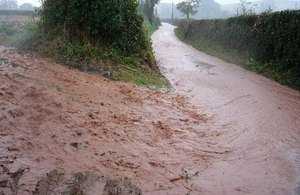Environment Agency warns maize harvesting can result in run-off and pollution
Autumn harvesting using heavy machinery can often lead to soil compaction, with little time for remedial action before the winter sets in.

Excessive runoff from field of maize stubble
Although the weather has been dry this autumn enabling good harvesting conditions, the Environment Agency urges farmers to cultivate maize stubble as soon as possible before any wet weather sets in.
Stubble left in after harvest can lead to excessive runoff, causing localised flooding and where large amounts of soil enter a watercourse this can cause a pollution incident.
Louise Weller, for the Environment Agency, said:
In the past, farmers may have been unaware that their land or practices could be causing harm, or that they could face enforcement action if they caused significant pollution from excessive mud in rivers.
We have been running a number of awareness campaigns highlighting the problems and find farmers are very willing to take the steps needed to deal with maize stubble.
New rules are also now in place where farmers can have farm payment monies withheld if they cause soil erosion.
In spite of the later than normal harvest, our advice is still the same - cultivate maize stubble immediately after harvest to remove compacted wheel ruts to allow water to soak into the soil, and if necessary leave a rough surface over the winter period.
If conditions become wet do not sow following crops after maize by forcing them into the ground where this would cause further compaction leaving land vulnerable to runoff over the winter.
Notes to editors
All media enquiries 0800 917 9266.